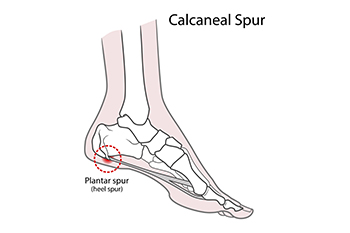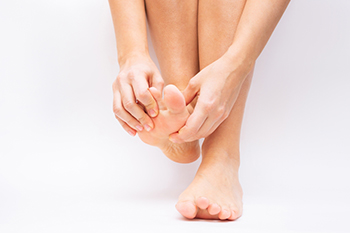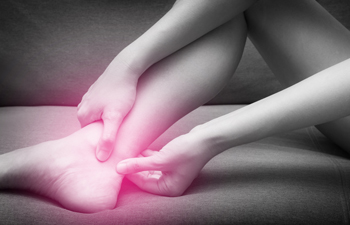Items filtered by date: March 2023
How Can I Prevent Heel Spurs?

Heel spurs are essentially bony hooks that can develop on the bottoms of the feet. As a result of heel spurs, a patient may experience pain that can slowly become a dull ache. Luckily, there are many steps that an individual can take to help prevent the onset of heel spurs. For example, one can monitor their weight and ensure that they do not become obese. This is because excess body weight can put added pressure on the heels, which ultimately makes heel spurs more likely. Additionally, an individual might consider using the proper footwear. Wearing shoes that are old and worn may negatively affect your gait. If you are someone that is currently living with heel spurs or are particularly concerned about developing heel spurs, it is highly suggested that you schedule an appointment with a podiatrist who can provide treatment and prevention methods that are best for you.
Heel spurs can be incredibly painful and sometimes may make you unable to participate in physical activities. To get medical care for your heel spurs, contact Dr. Mark Gagnon from Advanced Podiatry. Our doctor will do everything possible to treat your condition.
Heels Spurs
Heel spurs are formed by calcium deposits on the back of the foot where the heel is. This can also be caused by small fragments of bone breaking off one section of the foot, attaching onto the back of the foot. Heel spurs can also be bone growth on the back of the foot and may grow in the direction of the arch of the foot.
Older individuals usually suffer from heel spurs and pain sometimes intensifies with age. One of the main condition's spurs are related to is plantar fasciitis.
Pain
The pain associated with spurs is often because of weight placed on the feet. When someone is walking, their entire weight is concentrated on the feet. Bone spurs then have the tendency to affect other bones and tissues around the foot. As the pain continues, the feet will become tender and sensitive over time.
Treatments
There are many ways to treat heel spurs. If one is suffering from heel spurs in conjunction with pain, there are several methods for healing. Medication, surgery, and herbal care are some options.
If you have any questions feel free to contact one of our offices located in Crestwood, Orland Park, and Summit, IL . We offer the latest in diagnostic and treatment technology to meet your needs.
How Falling May Affect the Feet

Falling is unnatural. The feet can hurt from falling, and lifestyle habits may temporarily or permanently be altered. Possible foot injuries can include a sprained ankle, broken foot, or a bruised or broken toe. Any of these injuries may impact the ability to walk, and patients may have to use crutches for mobility. The risk of falling can be lowered by implementing successful fall prevention strategies. These can include improving lighting in the household, removing worn rugs from the living area, and starting a gentle exercise routine. This is beneficial in keeping the body strong, which may help to prevent falling. Additionally, it is wise to have regular physical and eye examinations which can help to update existing medications and eyeglasses. People have found falling episodes may be reduced by installing grab bars in the toilet and shower area, in addition to using a non-slip bath mat. If you would like more information about fall prevention techniques, it is suggested that you confer with a podiatrist who can provide you with helpful information.
Preventing falls among the elderly is very important. If you are older and have fallen or fear that you are prone to falling, consult with Dr. Mark Gagnon from Advanced Podiatry. Our doctor will assess your condition and provide you with quality advice and care.
Every 11 seconds, an elderly American is being treated in an emergency room for a fall related injury. Falls are the leading cause of head and hip injuries for those 65 and older. Due to decreases in strength, balance, senses, and lack of awareness, elderly persons are very susceptible to falling. Thankfully, there are a number of things older persons can do to prevent falls.
How to Prevent Falls
Some effective methods that older persons can do to prevent falls include:
- Enrolling in strength and balance exercise program to increase balance and strength
- Periodically having your sight and hearing checked
- Discuss any medications you have with a doctor to see if it increases the risk of falling
- Clearing the house of falling hazards and installing devices like grab bars and railings
- Utilizing a walker or cane
- Wearing shoes that provide good support and cushioning
- Talking to family members about falling and increasing awareness
Falling can be a traumatic and embarrassing experience for elderly persons; this can make them less willing to leave the house, and less willing to talk to someone about their fears of falling. Doing such things, however, will increase the likelihood of tripping or losing one’s balance. Knowing the causes of falling and how to prevent them is the best way to mitigate the risk of serious injury.
If you have any questions, please feel free to contact one of our offices located in Crestwood, Orland Park, and Summit, IL . We offer the newest diagnostic and treatment technologies for all your foot care needs.
What Can Cause Your Toes to Swell

Any number of conditions can cause your toes to become swollen, ranging from injury to an allergic reaction. Swelling, or edema, is generally an early warning system from your body, as it generally indicates a problem of some sort. Among the common reasons for toe edema are gout, arthritis, and diabetes. Another cause of swelling in the toes is a circulation problem known as venous insufficiency. This means blood doesn’t flow properly from the extremities to the heart. Edema in the toes also may be caused by cellulitis, a serious inflammation of the skin tissues that can result from a number of conditions. Other causes of swelling in the toes include ingrown toenails, an infection, and footwear that is too tight. Some of these conditions indicate underlying problems that may take time to be corrected, and others can be easily handled by a visit to the podiatrist. The main thing to remember is that swelling is a warning sign from your body that something is amiss. If your toe swells, it is suggested that you consult a podiatrist for an examination and a diagnosis.
Swollen feet can be a sign of an underlying condition. If you have any concerns, contact Dr. Mark Gagnon of Advanced Podiatry. Our doctor can provide the care you need to keep you pain-free and on your feet.
Swollen feet are a common ailment among pregnant women and people who stand or sit for extended periods. Aging may increase the possibility of swollen feet and patients who are obese often notice when their feet are swelling too. There may be medical reasons why swollen feet occur:
- Phlebitis - A condition that causes the veins to become inflamed and can also cause leg pain.
- Liver disease - This may lead to low blood levels of albumin which is a protein. This can cause fluid in the blood to pass into the tissues and several areas of the body can become swollen.
- Heart failure - When the heart doesn’t pump properly the blood that is normally pumped back to the heart can pool in the veins of the legs causing swollen feet.
- Kidney disease - One of the main functions of the kidneys is releasing excess fluid in the body. This type of condition can make it difficult for the kidneys to function properly, and as a result the feet may become swollen.
- Deep-vein thrombosis (DVT)- This is a serious condition where blood clots form in the veins of the legs. They can block the return of blood from the legs to the heart which may cause the feet to swell. It is important to be treated by a podiatrist if this condition is present.
Swollen feet can also be caused by bone and tendon conditions, including fractures, arthritis, and tendinitis. Additionally, there may be skin and toenail conditions and an infection may cause the feet to swell. Patients who take medicine to treat high blood pressure may be prone to getting swollen feet.
Many patients elevate their feet to help relieve the swelling and this is generally a temporary remedy. When a podiatrist is consulted the reason behind the swelling can be uncovered and subsequently treated.
If you have any questions please feel free to contact one of our offices located in Crestwood, Orland Park, and Summit, IL . We offer the newest diagnostic tools and technology to treat your foot and ankle needs.
Achilles Tendon Pain Often Requires Treatment

The Achilles tendon connects the muscles in the calf and lower leg to the heel bone. Like all tendons, this tendon is strong but not particularly flexible. If it is overstretched, it can become inflamed, which is tendonitis, or torn, and this is known as a rupture. When not taken care of, a condition called tendinosis can develop and chronic issues with the Achilles tendon will result. Achilles tendon injuries can cause mild to severe pain, burning, and stiffness in the Achilles tendon area or heel. These types of injuries are more common among athletes, especially runners, and those who play sports that require multiple starts, stops, and sudden changes of direction. Other groups of people who can be prone to getting Achilles tendon injuries are those who do not warm up prior to exercising, or those who increase the amount or intensity of their workouts suddenly. Additionally, patients who are obese, and those with prior health conditions, such as psoriasis or high blood pressure, may also be susceptible to incurring this type of injury. A rupture is a rare and serious Achilles tendon injury, and walking will usually be unbearable. If you have sustained an injury to your Achilles tendon, it is suggested that you see a podiatrist who can begin treatment as soon as possible, which may help to avoid further complications.
Achilles tendon injuries need immediate attention to avoid future complications. If you have any concerns, contact Dr. Mark Gagnon of Advanced Podiatry. Our doctor can provide the care you need to keep you pain-free and on your feet.
What Is the Achilles Tendon?
The Achilles tendon is a tendon that connects the lower leg muscles and calf to the heel of the foot. It is the strongest tendon in the human body and is essential for making movement possible. Because this tendon is such an integral part of the body, any injuries to it can create immense difficulties and should immediately be presented to a doctor.
What Are the Symptoms of an Achilles Tendon Injury?
There are various types of injuries that can affect the Achilles tendon. The two most common injuries are Achilles tendinitis and ruptures of the tendon.
Achilles Tendinitis Symptoms
- Inflammation
- Dull to severe pain
- Increased blood flow to the tendon
- Thickening of the tendon
Rupture Symptoms
- Extreme pain and swelling in the foot
- Total immobility
Treatment and Prevention
Achilles tendon injuries are diagnosed by a thorough physical evaluation, which can include an MRI. Treatment involves rest, physical therapy, and in some cases, surgery. However, various preventative measures can be taken to avoid these injuries, such as:
- Thorough stretching of the tendon before and after exercise
- Strengthening exercises like calf raises, squats, leg curls, leg extensions, leg raises, lunges, and leg presses
If you have any questions please feel free to contact one of our offices located in Crestwood, Orland Park, and Summit, IL . We offer the newest diagnostic tools and technology to treat your foot and ankle needs.

